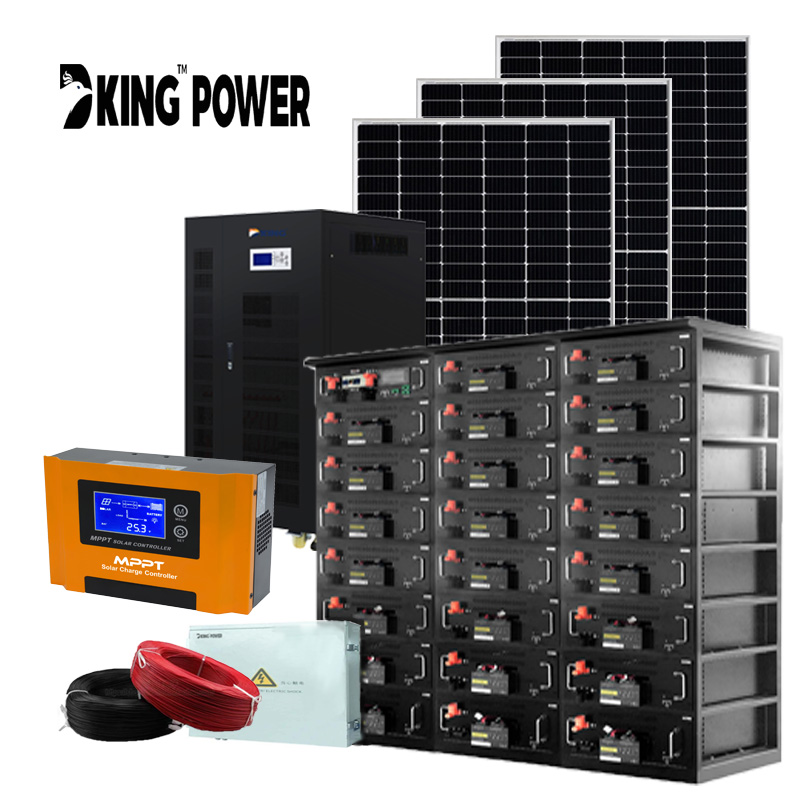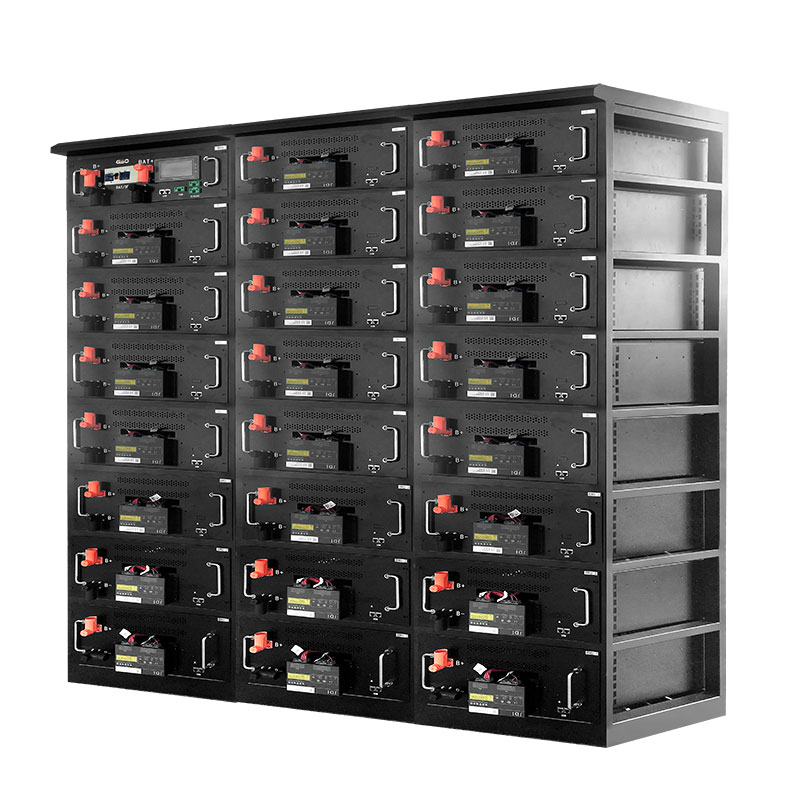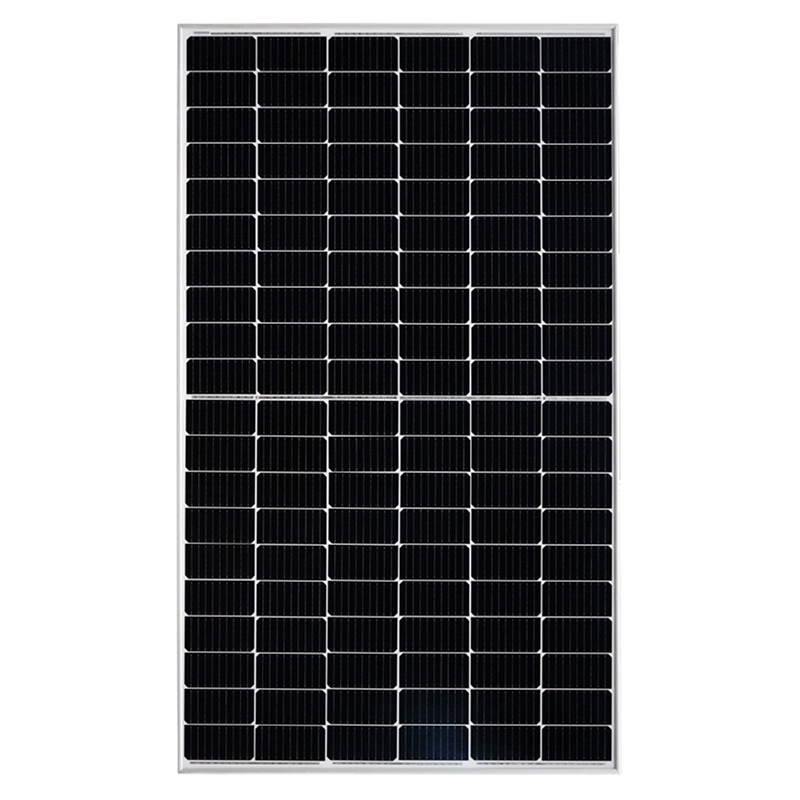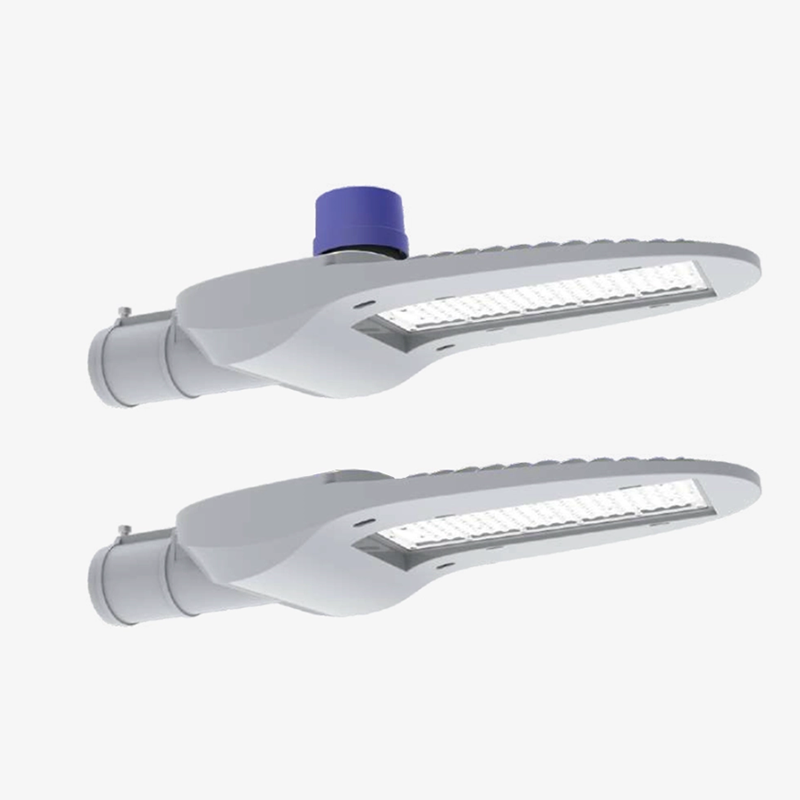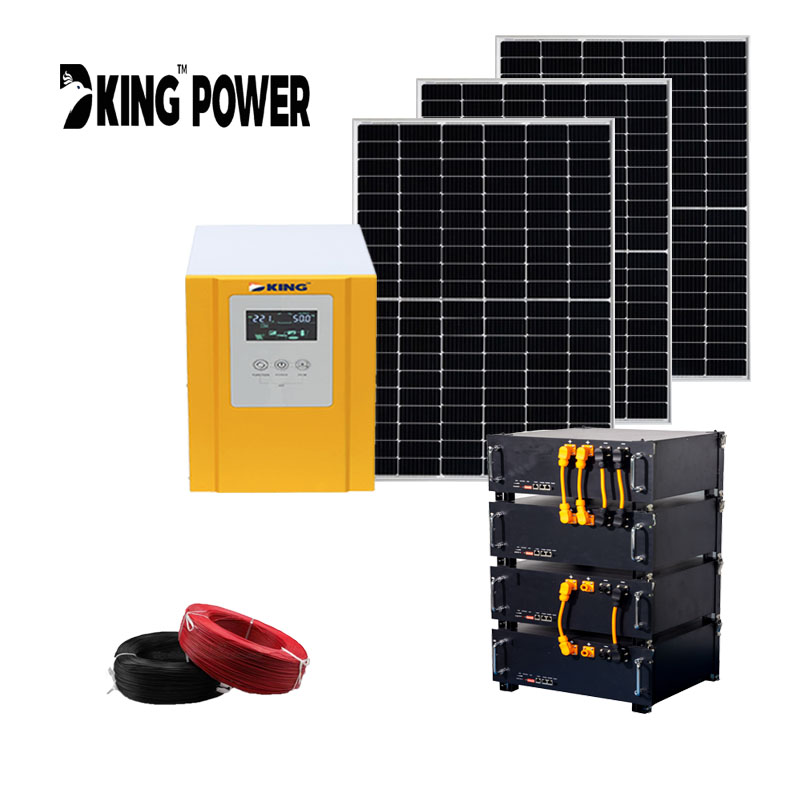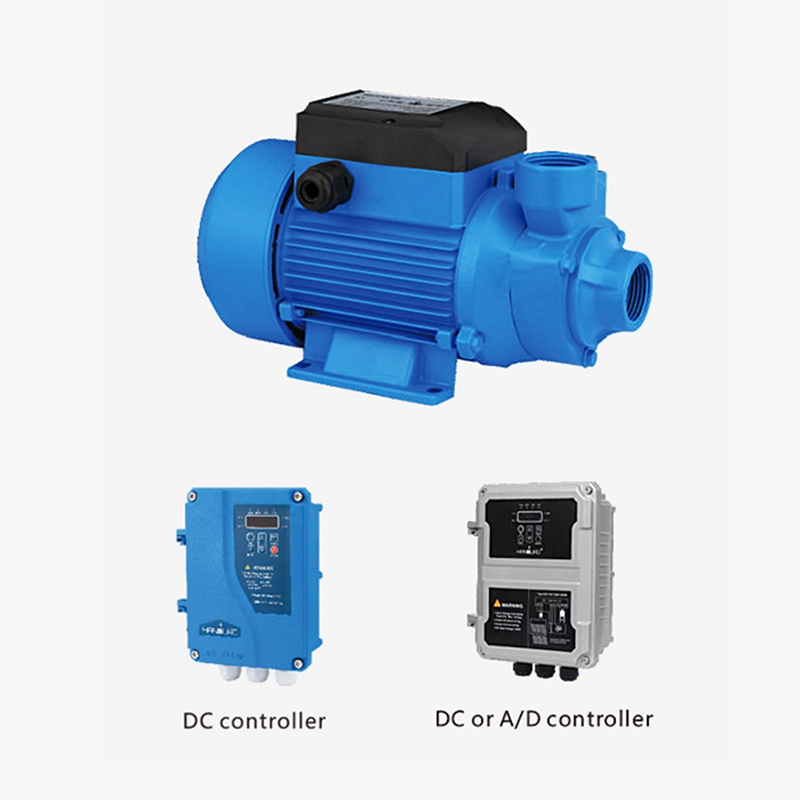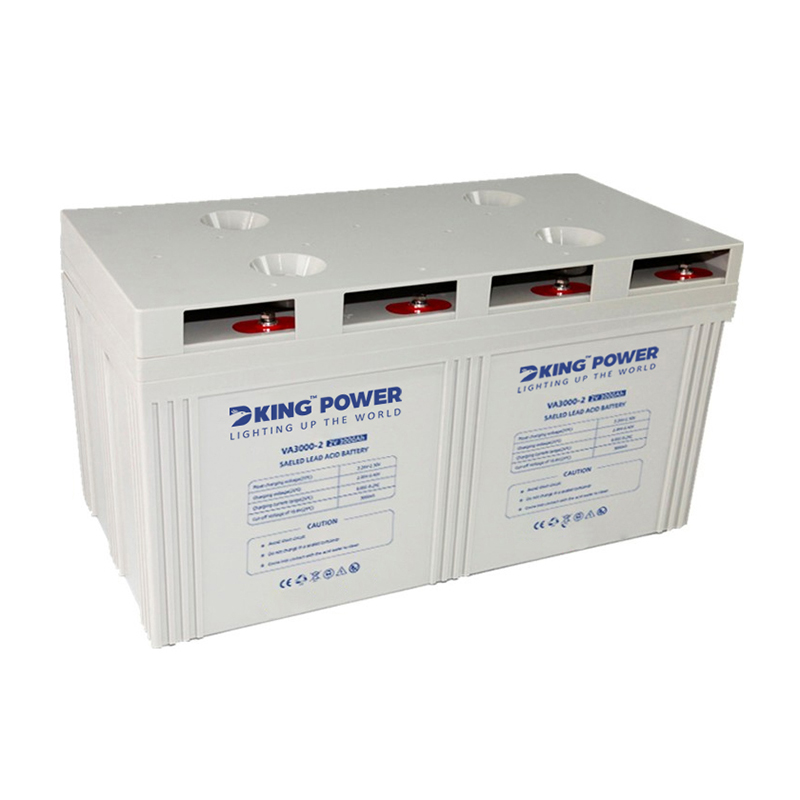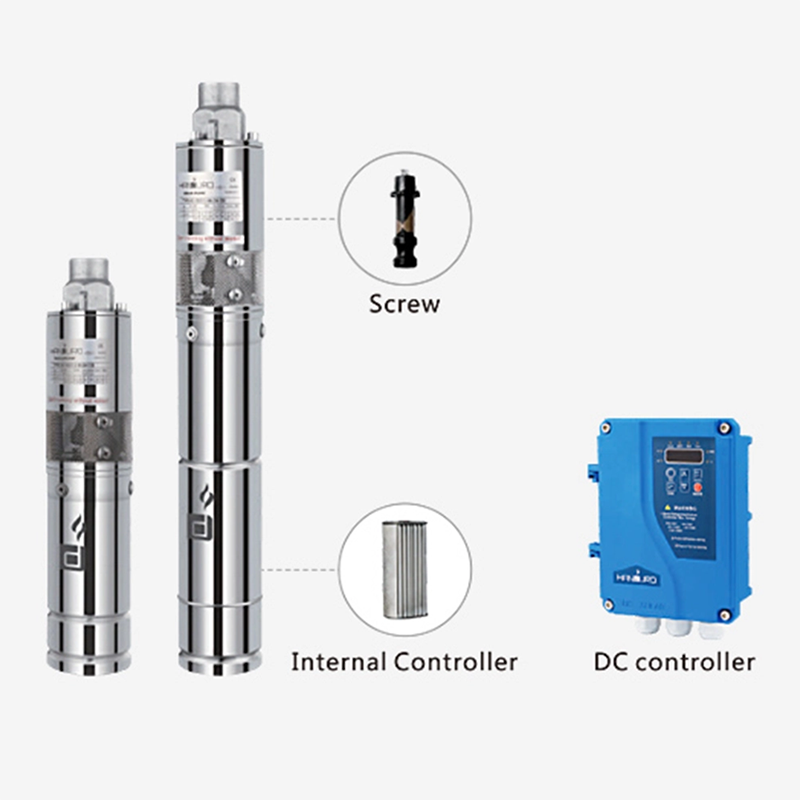DKSESS 100KW OFF GRID/HYBRID ALL IN ONE SOLAR POWER SYSTEM
The diagram of the system

System configuration for reference
|
Solar Panel |
Polycrystalline 330W |
192 |
16pcs in series, 12 groups in parallel |
|
Three Phase Solar inverter |
384VDC 100KW |
1 |
HDSX-104384 |
|
Solar Charge Controller |
384VDC 100A |
2 |
MPPT controller |
|
Lead acid battery |
12V200AH |
96 |
32in series, 3 groups in parallel |
|
Battery connecting cable |
70mm² 60CM |
95 |
connection between batteries |
|
solar panel mounting bracket |
Aluminum |
16 |
Simple type |
|
PV combiner |
3in1out |
4 |
Specifications:1000VDC |
|
Lightning protection distribution box |
without |
0 |
|
|
battery collecting box |
200AH*32 |
3 |
|
|
M4 plug (male and female) |
|
180 |
180 pairs 一in一out |
|
PV Cable |
4mm² |
400 |
PV Panel to PV combiner |
|
PV Cable |
10mm² |
200 |
PV combiner--Solar inverter |
|
Battery cable |
70mm² 10m/pcs |
42 |
Solar Charge Controller to battery and PV combiner to Solar Charge Controller |
|
Package |
wooden case |
1 |
The ability of the system for reference
|
Electrical Appliance |
Rated Power(pcs) |
Quantity(pcs) |
Working Hours |
Total |
|
LED bulbs |
13 |
10 |
6Hours |
780W |
|
Mobile phone charger |
10W |
4 |
2Hours |
80W |
|
Fan |
60W |
4 |
6Hours |
1440W |
|
TV |
150W |
1 |
4Hours |
600W |
|
Satellite dish receiver |
150W |
1 |
4Hours |
600W |
|
Computer |
200W |
2 |
8Hours |
3200W |
|
Water pump |
600W |
1 |
1Hours |
600W |
|
Washing machine |
300W |
1 |
1Hours |
300W |
|
AC |
2P/1600W |
4 |
12Hours |
76800W |
|
Microwave oven |
1000W |
1 |
2Hours |
2000W |
|
Printer |
30W |
1 |
1Hours |
30W |
|
A4 copier (printing and copying combined) |
1500W |
1 |
1Hours |
1500W |
|
Fax |
150W |
1 |
1Hours |
150W |
|
Induction cooker |
2500W |
1 |
2Hours |
5000W |
|
Refrigerator |
200W |
1 |
24Hours |
4800W |
|
Water heater |
2000W |
1 |
2Hours |
4000W |
|
|
|
|
Total |
101880W |
Key Components of 100kw off grid solar power system
1. Solar panel
Feathers:
● Large area battery: increase the peak power of components and reduce the system cost.
● Multiple main grids: effectively reduce the risk of hidden cracks and short grids.
● Half piece: reduce the operating temperature and hot spot temperature of components.
● PID performance: the module is free from attenuation induced by potential difference.

2. Battery
Feathers:
Rated Voltage: 12v*32PCS in series*2 sets in parallel
Rated Capacity: 200 Ah (10 hr, 1.80 V/cell, 25 ℃)
Approximate Weight(Kg,±3%): 55.5 kg
Terminal: Copper
Case: ABS
● Long cycle-life
● Reliable sealing performance
● High initial capacity
● Small self-discharge performance
● Good discharge performance at high-rate
● Flexible and convenient installation, esthetic overall look

Also you can choose 384V600AH Lifepo4 lithium battery
Features:
Nominal Voltage: 384v 120s
Capacity: 600AH/230.4KWH
Cell type: Lifepo4, pure new, grade A
Rated Power: 200kw
Cycle time: 6000 times

3. Solar inverter
Feature:
● Pure sine wave output.
● Low DC voltage, saving system cost.
● Built-in PWM or MPPT charge controller.
● AC charge current 0-45A adjustable.
● Wide LCD screen, clearly and precisely shows icon data.
● 100% imbalance loading design, 3 times peak power.
● Setting different working modes based on variable usage requirements.
● Various communication ports and Remote monitoring RS485/APP(WIFI/GPRS) (Optional)

4. Solar Charge Controller
384v100A MPPT controller bulit in inverter
Feature:
● Advanced MPPT tracking, 99% tracking efficiency. Compared with PWM, the generating efficiency increase near 20%;
● LCD display PV data and chart simulates power generation process;
● Wide PV input voltage range, convenient for system configuration;
● Intelligent battery management function, extend battery life;
● RS485 communication port optional.

What service we offer?
1. Design service.
Just let us know the features you want, such as the power rate, the applications you want to load, how many hours you need the system to work etc. We will design a reasonable solar power system for you.
We will make a diagram of the system and the detailed configuration.
2. Tender Services
Assist guests in preparing bid documents and technical data
3. Training service
If you a new one in the energy storage business, and you need a training, you can come our company to learn or we send technicians to help you to train your stuff.
4. Mounting service& maintenance service
We also offer mounting service and maintenance service with seasonable & affordable cost.

5. Marketing support
We give big support to the customers who agent our brand "Dking power".
we send engineers and technicians to support you if necessary.
we send certain percent extra parts of some of the products as replacements freely.
What is the minimum and max solar power system you can produce?
The minimum solar power system we produced is around 30w, such as solar street light. But normally the minimum for home use is 100w 200w 300w 500w etc.
Most of people prefer 1kw 2kw 3kw 5kw 10kw etc for home use, normally it is AC110v or 220v and 230v.
The max solar power system we produced is 30MW/50MWH.


How is your quality?
Our quality is very high,because we use very high quality materials and we make rigorous tests of the materials. And we have very strict QC system.

Do you accept customized producing?
Yes. just tell us what you want. We customized R&D and producing energy storage lithium batteries, low temperature lithium batteries, motive lithium batteries, off high way vehicle lithium batteries, solar power systems etc.
What is the lead time?
Normally 20-30 days
How you guarantee your products?
During the warranty period, if it is the product reason, we will send you replacement of the product. Some of the products we will send you new one with next shipping. Different products with different warranty terms. But before we sending, we need a picture or video to make sure it is the problem of our products.
workshops











Cases
400KWH (192V2000AH Lifepo4 and solar energy storage system in Philippines )

200KW PV+384V1200AH (500KWH) solar and lithium battery energy storage system in Nigeria

400KW PV+384V2500AH (1000KWH) solar and lithium battery energy storage system in America.



Certifications

Comparison of batteries in energy storage system
Battery type energy storage is chemical energy storage. It can be divided into lead acid battery, lithium battery, nickel hydrogen battery, liquid flow battery (vanadium battery), sodium sulfur battery, lead carbon battery, etc. according to the type of battery selected.
1. Lead acid battery
Lead acid batteries include colloid and liquid (the so-called ordinary lead acid battery). These two types of batteries are used according to different regions. The colloid battery has strong cold resistance, and its working energy efficiency is far better than that of the liquid battery when the temperature is below 15 ° C, and its thermal insulation performance is excellent.
Colloid lead-acid battery is an improvement on the common lead-acid battery with liquid electrolyte. The colloid electrolyte is used to replace the sulfuric acid electrolyte, which is better than the common battery in terms of safety, storage capacity, discharge performance and service life. Colloidal lead-acid battery adopts gel electrolyte, and there is no free liquid inside. Under the same volume, the electrolyte has large capacity, large heat capacity, and strong heat dissipation ability, which can avoid the thermal runaway phenomenon of general batteries; The corrosion of electrode plate is weak due to low electrolyte concentration; The concentration is uniform and there is no electrolyte stratification.
Ordinary lead-acid battery is a kind of battery whose electrode is mainly made of lead and its oxide, and the electrolyte is sulfuric acid solution. In the discharge state of lead-acid battery, the main component of positive electrode is lead dioxide, and the main component of negative electrode is lead; In charging state, the main components of positive and negative electrodes are lead sulfate. The nominal voltage of a single cell lead-acid battery is 2.0V, which can be discharged to 1.5V and charged to 2.4V; In application, six single cell lead-acid batteries are often used in series to form a 12V nominal lead-acid battery, as well as 24V, 36V, 48V, etc.
Its advantages mainly include: safe sealing, air release system, simple maintenance, long service life, stable quality, high reliability, and maintenance free; The disadvantage is that the lead pollution is large and the energy density is low (that is, too heavy).
2. Lithium battery
"Lithium battery" is a kind of battery with lithium metal or lithium alloy as cathode material and non-aqueous electrolyte solution. It is divided into two categories: lithium metal battery and lithium ion battery.
Lithium metal battery generally uses manganese dioxide as cathode material, metal lithium or its alloy metal as cathode material, and uses non-aqueous electrolyte solution. Lithium ion batteries generally use lithium alloy metal oxides as cathode materials, graphite as cathode materials, and non-aqueous electrolytes. Lithium ion batteries do not contain metallic lithium and can be recharged. The lithium battery we use in energy storage is a lithium ion battery, referred to as "lithium battery".
The lithium batteries used in the energy storage system mainly include: lithium iron phosphate battery, ternary lithium battery and lithium manganate battery. The single battery has high voltage, wide working temperature range, high specific energy and efficiency, and low self discharge rate. The safety and life can be improved by using protection and equalization circuits. Therefore, considering the advantages and disadvantages of various batteries, lithium batteries have become the first choice for energy storage power stations due to their relatively mature industrial chain, safety, reliability and environmental friendliness.
Its main advantages are: long service life, high storage energy density, light weight and strong adaptability; The disadvantages are poor safety, easy explosion, high cost and limited use conditions.
Lithium iron phosphate
Lithium iron phosphate battery refers to the lithium ion battery using lithium iron phosphate as the cathode material. The cathode materials of lithium ion batteries mainly include lithium cobalate, lithium manganate, lithium nickel oxide, ternary materials, lithium iron phosphate, etc. Lithium cobalate is the cathode material used by most lithium ion batteries.
Lithium iron phosphate as a lithium power battery material only appeared in recent years. It was in 2005 that a large capacity lithium iron phosphate battery was developed in China. Its safety performance and cycle life are incomparable with other materials. The cycle life of 1C charging and discharging reaches 2000 times. The overcharge voltage of a single battery is 30V, which will not burn and puncture will not explode. Lithium ion batteries with large capacity made of lithium iron phosphate cathode materials are easier to be used in series to meet the needs of frequent charging and discharging of electric vehicles.
Lithium iron phosphate is non-toxic, pollution-free, safe, widely sourced raw materials, cheap, long life and other advantages. It is an ideal cathode material for new generation lithium ion batteries. Lithium iron phosphate battery also has its disadvantages. For example, the tamping density of lithium iron phosphate cathode material is small, and the volume of lithium iron phosphate battery with equal capacity is larger than lithium ion batteries such as lithium cobalate, so it has no advantages in micro batteries.
Due to the inherent characteristics of lithium iron phosphate, its low-temperature performance is inferior to other cathode materials such as lithium manganate. In general, for a single cell (note that it is a single cell rather than a battery pack), the measured low-temperature performance of the battery pack may be slightly higher,
This is related to the heat dissipation conditions), its capacity retention rate is about 60~70% at 0 ℃, 40~55% at - 10 ℃, and 20~40% at - 20 ℃. Such low temperature performance obviously cannot meet the use requirements of power supply. At present, some manufacturers have improved the low-temperature performance of lithium iron phosphate by improving the electrolyte system, improving the positive electrode formula, improving the material performance and improving the design of the cell structure.
Ternary lithium battery
Ternary polymer lithium battery refers to the lithium battery whose cathode material is lithium nickel cobalt manganate (Li (NiCoMn) O2) ternary cathode material. The ternary composite cathode material is made of nickel salt, cobalt salt and manganese salt as raw materials. The proportion of nickel, cobalt and manganese in the ternary polymer lithium battery can be adjusted according to actual needs. The battery with ternary material as cathode has high safety compared with lithium cobalt battery, but its voltage is too low.
Its main advantages are: good cycle performance; The disadvantage is that the use is limited. However, due to the tightening of domestic policies on ternary lithium batteries, the development of ternary lithium batteries tends to slow down.
Lithium manganate battery
Lithium manganate battery is one of the more promising lithium ion cathode materials. Compared with traditional cathode materials such as lithium cobalate, lithium manganate has the advantages of rich resources, low cost, no pollution, good safety, good multiplying performance, etc. It is an ideal cathode material for power batteries. However, its poor cycle performance and electrochemical stability greatly limit its industrialization. Lithium manganate mainly includes spinel lithium manganate and layered lithium manganate. The spinel lithium manganate has a stable structure and is easy to realize industrial production. Today's market products are all of this structure. Spinel lithium manganate belongs to cubic crystal system, Fd3m space group, and the theoretical specific capacity is 148mAh/g. Because of the three-dimensional tunnel structure, lithium ions can be reversibly de embedded from the spinel lattice without causing the collapse of the structure, so it has excellent magnification performance and stability.
3. NiMH battery
NiMH battery is a kind of battery with good performance. The positive active substance of nickel hydrogen battery is Ni (OH) 2 (called NiO electrode), the negative active substance is metal hydride, also called hydrogen storage alloy (called hydrogen storage electrode), and the electrolyte is 6mol/L potassium hydroxide solution.
Nickel metal hydride battery is divided into high-voltage nickel metal hydride battery and low-voltage nickel metal hydride battery.
Low voltage nickel metal hydride battery has the following characteristics: (1) The battery voltage is 1.2~1.3 V, which is equivalent to nickel cadmium battery; (2) High energy density, more than 1.5 times of that of nickel cadmium battery; (3) Fast charging and discharging, good low-temperature performance; (4) Sealable, strong overcharge and discharge resistance; (5) No dendritic crystal generation, which can prevent short circuit in the battery; (6) Safe and reliable, no pollution to the environment, no memory effect, etc.
High voltage nickel hydrogen battery has the following characteristics: (1) Strong reliability. It has good over discharge and over charge protection, can withstand high charge discharge rate and has no dendrite formation. It has good specific property. Its specific mass capacity is 60A · h/kg, which is 5 times of that of nickel cadmium battery. (2) Long cycle life, up to thousands of times. (3) Fully sealed, less maintenance. (4) The low temperature performance is excellent, and the capacity does not change significantly at - 10 ℃.
The main advantages of NiMH battery are: high energy density, fast charging and discharging speed, light weight, long service life, no environmental pollution; The disadvantages are slight memory effect, more management problems, and easy to form single battery separator melting.
4. Flow cell
Liquid flow battery is a new type of battery. Liquid flow battery is a high-performance battery that uses positive and negative electrolyte to separate and circulate separately. It has the characteristics of high capacity, wide application field (environment) and long cycle life. It is a new energy product at present.
Liquid flow battery is generally used in the system of energy storage power station, which consists of stack unit, electrolyte solution and electrolyte solution storage and supply unit, control and management unit, etc. The core is composed of a stack and (the stack is composed of dozens of cells for oxidation reduction reaction) and a single cell for charging and discharging according to specific requirements in series, and its structure is similar to that of a fuel cell stack.
Vanadium flow battery is a new type of power storage and energy storage equipment. It can not only be used as a supporting energy storage device for solar and wind power generation processes, but also can be used for peak shaving of power grid to improve the stability of power grid and ensure the security of power grid. Its main advantages are: flexible layout, long cycle life, fast response times, and no harmful emission; The disadvantage is that the energy density varies greatly.
5. Sodium sulfur battery
The sodium sulfur battery is composed of positive pole, negative pole, electrolyte, diaphragm and shell. Unlike ordinary secondary batteries (lead-acid batteries, nickel cadmium batteries, etc.), the sodium sulfur battery is composed of molten electrode and solid electrolyte. The active substance of the negative pole is molten metal sodium, and the active substance of the positive pole is liquid sulfur and molten sodium polysulfide. Secondary battery with metal sodium as negative electrode, sulfur as positive electrode and ceramic tube as electrolyte separator. Under a certain working degree, sodium ions can react reversibly with sulfur through the electrolyte membrane to form energy release and storage.
As a new type of chemical power source, this kind of battery has been greatly developed since it came into being. Sodium sulfur battery is small in size, large in capacity, long in life and high in efficiency. It is widely used in electric energy storage such as peak shaving and valley filling, emergency power supply and wind power generation.
Its main advantages are as follows: 1) It has higher specific energy (i.e., the effective electric energy per unit mass or unit volume of the battery). Its theoretical specific energy is 760Wh/Kg, which has actually exceeded 150Wh/Kg, 3-4 times that of lead-acid battery. 2) At the same time, it can discharge with large current and high power. Its discharge current density can generally reach 200-300mA/cm2, and it can release 3 times of its inherent energy in an instant; 3) High charging and discharging efficiency.
The sodium sulfur battery also has shortcomings. Its working temperature is 300-350 ℃, so the battery needs to be heated and kept warm during operation. However, this problem can be effectively solved by using high-performance vacuum thermal insulation technology.
6. Lead carbon battery
Lead carbon battery is a kind of capacitive lead acid battery, which is a technology evolved from traditional lead acid battery. It can significantly improve the life of lead acid battery by adding active carbon to the negative pole of the battery.
The lead carbon battery is a new type of super battery, which combines the lead acid battery and the super capacitor: it not only gives play to the advantages of the instant large capacity charging of the super capacitor, but also gives play to the specific energy advantage of the lead acid battery, and has very good charging and discharging performance - it can be fully charged in 90 minutes (if the lead acid battery is charged and discharged in this way, its life is less than 30 times). Moreover, due to the addition of carbon (graphene), the phenomenon of sulfation of the negative electrode is prevented, which improves a factor of battery failure in the past and extends the battery life.
The lead carbon battery is a mixture of asymmetric supercapacitor and lead acid battery in the form of internal parallel connection. As a new type of super battery, the lead carbon battery is a combination of the technologies of lead acid battery and supercapacitor. It is a dual function energy storage battery with both capacitive characteristics and battery characteristics. Therefore, it not only gives full play to the advantages of super capacitor instantaneous power charging with large capacity, but also gives full play to the energy advantages of lead-acid batteries, which can be fully charged in an hour. It has good charging and discharging performance. Due to the use of lead carbon technology, the performance of lead carbon battery is far superior to that of traditional lead acid battery, which can be used in new energy vehicles, such as hybrid electric vehicles, electric bicycles and other fields; It can also be used in the field of new energy storage, such as wind power generation and energy storage.

